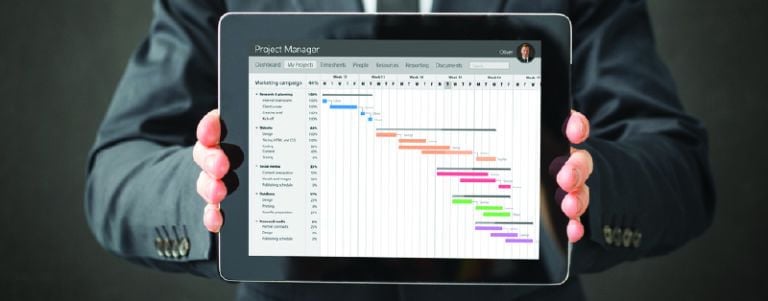What are Lean Principles vs. Agile vs. DevOps? Project Management

Understanding what are Lean principles, Agile methodologies, and DevOps practices is crucial in project management and delivery. These three frameworks, each with its unique focus and strengths, have effectively reshaped how projects are managed. This brings us to the question: Which practice is best suited for effective project management? Let’s explore the same below to understand what are Lean principles in a better manner.
In this blog, you will learn:
- Understanding Lean Principles
- Embracing Agile Methodologies
- Harnessing the Power of DevOps
- Comparative Analysis
- Integrating Lean, Agile, and DevOps
Understanding Lean Principles
Lean thinking, breaking through the clutter, and optimizing work processes is highly useful to raise project productivity and quality. Let’s find out how.
Overview of Lean in Project Management
- Lean Thinking and Its Origin
Lean principles, born from Toyota’s production system, are more than just buzzwords; they are a mindset shift toward efficiency and waste reduction. These principles, deeply rooted in manufacturing, have seamlessly transitioned into the realm of project management. In essence, they offer a structured approach to managing projects with an emphasis on efficiency and customer value.
- Core Principles of Lean Project Management
At the heart of Lean project management lie three core principles:
- The elimination of waste which allows teams to focus on what truly adds value
- Continuous improvement to ensure that processes are always evolving and adapting
- A focus on customer value to keep the project aligned with end-user needs
To sum up, understanding what are Lean principles is to go beyond the theory. Rather, consider them as practical guidelines that steer project managers toward more efficient workflows.
Application of Lean in Project Management
When we delve into Lean tools and techniques, we can uncover practical methods for bringing what are Lean principles to life. Here are a few key tools to help you get started:
Value Stream Mapping
Value stream mapping involves creating a visual representation of all steps in a process, highlighting where value is added and where waste occurs.
Kanban
Kanban is all about visual management. As a matter of fact, it uses cards and boards to visualize work and workflow. This simple but effective tool helps teams see the progress of work items, manage workloads, and ensure a steady flow of work.
5S Principles
The 5S framework—sort, set in order, shine, standardize, and sustain—is a systematic approach to workplace organization. By organizing and standardizing the work environment, teams can reduce time wasted looking for resources or information, thus streamlining their workflow
ALSO READ: Exploring the Work of 6 Famous Product Designers and Key Learnings
Embracing Agile Methodologies
Before we look at how Agile has a dynamic approach to project management, we need to understand what are Agile values and principles.
Introduction to Agile in Project Management
- Agile Manifesto and Its Values
Agile entails a shift in mindset, as outlined in the Agile Manifesto. It helps foster a project management environment that is not only flexible but also highly responsive to change. In essence, they’re a set of guidelines that champion adaptability and a customer-centric approach, ensuring that the project team remains Agile in the truest sense of the word.
- Agile Principles and Their Impact on Project Teams
Agile principles significantly transform the dynamics within project teams, thereby prioritizing flexibility and responsiveness. Here are some ways they impact project teams:
- Agile emphasizes the value of individuals and their interactions over rigid processes and tools. Consequently, this fosters a collaborative and adaptable work environment. Therefore, team communication and creativity are prioritized over strict adherence to predefined processes.
- It advocates for prioritizing working solutions over extensive documentation. This principle, in essence, shifts the emphasis toward delivering functional, tangible results quickly. After all, getting bogged down in detailed documentation will not contribute directly to the end goal.
- Agile places a high value on customer collaboration over contract negotiation. By doing so, it ensures that the project outcome is more closely aligned with client needs and expectations, thus increasing client satisfaction and the relevance of the product or service delivered.
ALSO READ: Kanban vs Scrum: A Guide on These 2 Different Agile Methodologies
Agile Frameworks
Now that we are familiar with what are agile principles, let’s look at some of their practical manifestations.
Scrum
This is an Agile framework that guides teams toward iterative and incremental project delivery. Scrum involves defined roles like the product owner, scrum master, and the development team, each with specific responsibilities. Scrum events, such as sprint planning, daily stand-ups, sprint reviews, and sprint retrospectives, are integral to the framework. In essence, these events ensure continuous communication and adaptation.
Kanban
Kanban, another Agile framework, takes a slightly different approach, focusing on visualizing work and ensuring continuous delivery. In particular, Kanban uses boards and cards to represent tasks and their status. This visualization makes it easier for teams to see bottlenecks and balance workloads. Thus, it aligns perfectly with what are Agile values and principles, emphasizing efficiency and continuous improvement.
ALSO READ: Who is a Project Manager? Salary, Skills & Career
Harnessing the Power of DevOps in Project Management
What are the core principles of DevOps when it comes to efficient and effective project management? Before we get into that, let’s first look at what DevOps means.
Defining DevOps in Project Management
- Integration of Development and Operations
DevOps bridges the traditional gap between software development and IT operations. In fact, it is about integrating their workflows in a way that enhances efficiency and accelerates delivery.
- The Role of Continuous Integration and Delivery in DevOps
This is primarily achieved through the method of continuous integration and delivery (CI/CD). In essence, this approach allows for frequent, automated releases of software changes, playing a crucial role in enhancing the efficiency and effectiveness of the DevOps strategy.
Key Principles of DevOps
- Collaboration and Communication
What are the core principles of DevOps? Essentially, these principles include breaking down silos and fostering a culture of collaboration. Also, open communication between development and operations teams is paramount. This collaboration is essential for both problem-solving and efficient project execution.
- Automation of Processes
Automation entails streamlining workflows to enhance efficiency and reduce the likelihood of errors. Therefore, by automating repetitive tasks, teams can focus on more strategic as well as high-value work.
- Monitoring and Feedback
Continuous monitoring and feedback are vital components of DevOps. Therefore, this ongoing process effectively ensures that all issues are identified and addressed promptly. Consequently, it leads to a more resilient and high-performing system.
Implementing DevOps in Project Management
DevOps Tools and Their Role
What are the core principles of DevOps vis-à-vis their accurate implementation? To know how to do that means teams must know the tools that play pivotal roles in this regard. Let’s explore a few of them:
- Jenkins
Jenkins is an automation server used for continuous integration and delivery. In particular, it automates the process of building, testing, and deploying software, thus making it easier to integrate changes and deliver new versions quickly and efficiently.
- Docker
It simplifies software deployment by packaging applications into containers. These containers, therefore, are standardized units that bundle the application’s source code with all necessary operating system libraries and dependencies.
- Ansible
This is a powerful automation tool that automates cloud provisioning, configuration management, application deployment, intra-service orchestration, and many other IT needs. With Ansible, repetitive tasks are automated, thus reducing human error and inconsistencies
ALSO WATCH: What is Project Management? Different Types of Project Management
Comparative Analysis
What are Lean principles and how do they compare to Agile and DevOps? Let’s take a deeper dive into their distinct features.
Strengths and Weaknesses of Lean in Project Management
- Lean’s Focus on Efficiency and Waste Reduction
Lean principles are celebrated for their ability to create highly efficient processes, thus significantly reducing waste. These principles, central to what are Lean principles, streamline project workflows and ensure that every action adds value to the end product.
- Challenges in Adapting Lean to Dynamic Project Environments
However, adapting what are Lean principles to dynamic project environments can be challenging, as it requires a rigid adherence to processes that may not always fit with the fluid nature of some projects. Consequently, it may result in inflexibility. Therefore, while Lean is excellent for efficiency, its rigidity can sometimes be a drawback in rapidly changing scenarios.
Advantages and Disadvantages of Agile in Project Management
Agile’s Flexibility and Customer-Centric Approach
Agile is renowned for its adaptability and focus on customer needs. Understanding what are Agile principles will help you know that this is great in environments that demand flexibility and quick responses to change.
- Issues With Scaling Agile to Large Projects
Agile’s principles, however, are best suited for smaller and more flexible teams. Thus, while Agile offers significant advantages in adaptability and customer focus, it may not be effective for complex project structures.
ALSO READ: A Beginner’s Guide on Product Backlog in Scrum 2023
Evaluating the Impact of DevOps in Project Management
- Speed and Efficiency Gains With CI/CD
DevOps principles, particularly continuous integration and continuous delivery (CI/CD), are transformative in enhancing speed and efficiency in project management. Knowing what are DevOps principles enables teams to integrate and deliver changes more rapidly and reliably.
- Potential Challenges in Cultural and Organizational Transformation
Implementing DevOps often requires significant cultural and organizational changes. Evidently, this can be a substantial hurdle. Therefore, while DevOps offers remarkable improvements in speed and efficiency, it also demands a considerable shift in team dynamics and company culture.
ALSO READ: Know the 7 Best Time Management Apps to Use in 2023
Integrating Lean, Agile, and DevOps
Creating a Hybrid Approach
- Identifying Synergies Between Lean, Agile, and DevOps
Integrating Lean principles with Agile and DevOps can forge a powerful, hybrid approach. For instance, Lean’s emphasis on efficiency and waste reduction can effectively complement Agile’s adaptability and customer-centric approach. Moreover, incorporating DevOps principles can further enhance overall process speed and efficiency.
- Tailoring Practices to Project-Specific Needs
By combining learning from lean and agile frameworks with what are DevOps principles, project managers can craft a methodology that is not only efficient and flexible but also highly responsive to rapid changes and technological advancements. Additionally, this approach emphasizes the importance of customizing practices to align with the unique requirements and objectives of each project.
Case Studies of Successful Integration
- Real-World Examples of Organizations Combining Lean, Agile, and DevOps
Organizations that adeptly combine Lean, Agile, and DevOps principles can reap substantial benefits. By integrating Lean’s waste reduction strategies, Agile’s iterative development, and DevOps’ automation, they can achieve faster delivery times, produce higher-quality products, and utilize resources more efficiently. This approach has been successfully implemented by a diverse range of organizations, demonstrating its adaptability across different scales and sectors. Industry giants like Toyota, ING, and Spotify have all reaped benefits from its application. To illustrate this on a more specific scale, Brigham and Women’s Hospital leveraged the Lean-Agile framework to transform their annual wellness visits. This involved fostering collaboration among cross-functional teams and continuously refining their processes based on feedback from clinicians and patients. Such examples highlight the significant advantages and versatility of integrating Lean, Agile, and DevOps principles across various industries.
- Lessons Learned and Best Practices
Understanding what are Lean principles, Agile values and principles, and those of DevOps has yielded several key lessons:
- All three emphasize clear communication
- They focus on continuous learning
- Customizing integration is a key takeaway
- Furthermore, all three call for flexibility and structure
- Most importantly, prioritizing customer value takes on significance
- Finally, they speak to the importance of leveraging technology wisely
ALSO READ: A Quick Guide on the Best Agile Practices for Indian Product Managers
So, if you are looking to gain more nuanced insight into what are Lean principles and how they tally with other project management methodologies, consider joining Emeritus’ project management courses to enhance your career prospects.
Write to us at content@emeritus.org





